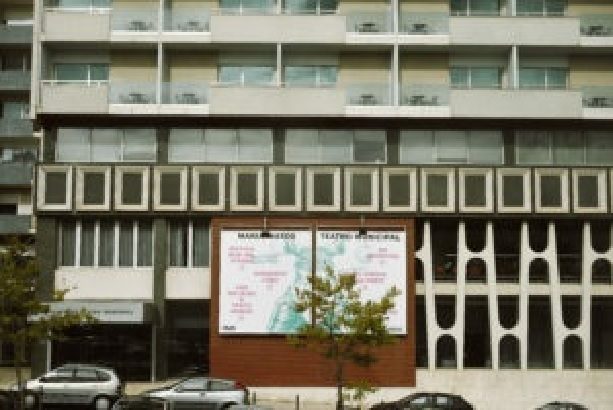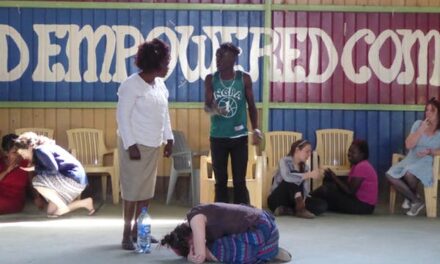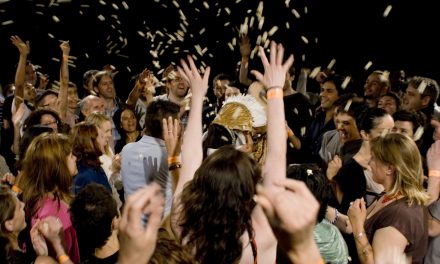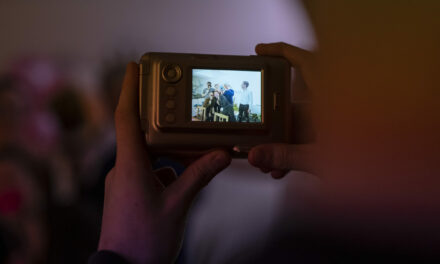Szabolcs Musca in conversation with Mark Deputter, Artistic Director of Teatro Maria Matos, Lisbon (Portugal). For Part I of this interview, click here.
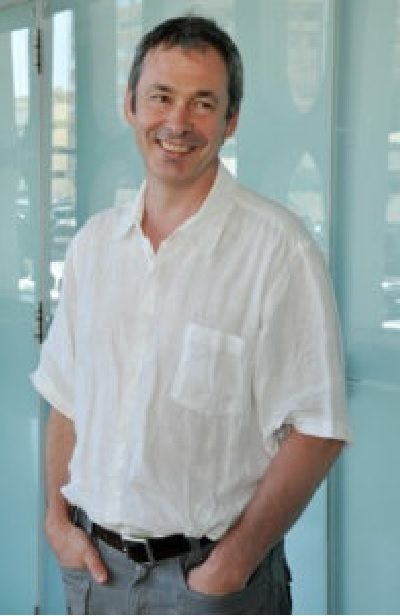
Mark Deputter. Photo by José Frade.
Mark Deputter was born in 1961 in Belgium. He studied Germanic Languages and Literature, followed by a postgraduate qualification in Drama and Theatre at the University of Leuven. He actively participated in the creation of the Institute for Theatre Studies, the first of its kind in Belgium. He was also a member of the editorial board for Etcetera theatre journal, regularly publishing articles on theatre and dance. In 1988, he became artistic director of the STUC, a small independent cultural center connected to the University of Leuven. During the eight years of his artistic directorship, STUC became one of the most active and influential centers of theatre in Belgium, programming important works from STAN, Forced Entertainment, Alain Platel, and more. Mark moved to Lisbon in 1995, where he became artistic co-director (with Mónica Lapa) of the Dance in the City festival, presenting, among others, Jérôme Bel, Meg Stuart, Vera Mantero and Francisco Camacho. Later, he joined Miguel Lobo Antunes’ programming team at Centro Cultural de Belém, where he was responsible for the dance program until 2001. In 2005, Mark created Alkantara Festival, a major European performing arts and dance festival in Lisbon and was responsible for the first two festival editions in 2006 and 2008, before becoming artistic director of Teatro Maria Matos in Lisbon in October 2008.
SM: I wanted to move towards your programming principles and, specifically, the thematic seasons you develop. Your thematic seasons are not just strongly socio-political, but also have an environmentalist agenda³. How did these thematic seasons come about? How were they conceived in the first place?
MD: That was part of our goal from the very beginning. Apart from the local, national, and international productions, we wanted to facilitate debates, inspired by the Ancient Greek theatre, which was a place for public debate, a space about the polis (city state) and politics. We started out with relatively small thematic programs, but they have grown in size and impact over the years. That also has to do with our growing confidence. In the arts, there’s always a kind of fear that artworks will be read from a certain point-of-view if they are part of a thematic program, reducing their richness. Productions can touch on certain themes, but they are never only about that theme; they always look at things from a variety of angles. I, myself was also afraid about this element of reduction, but after experimenting for a few years, I feel more and more confident that the theatre works we produce are strong enough and that the theatrical experience in itself is strong and won’t lose its richness just because it’s part of a thematic program. If a work of art manages to create a strong emotional and intellectual vibe, then audiences will go with the piece. Hence, in our programming policy, productions can stand alone, but can also be part of a thematic cycle alongside the conferences and debates we organize as part of that season.
SM: In previous years, you developed a couple of important thematic seasons on gender and green issues 4. Was the goal to map the artistic responses to these issues or open up the problems and face the audience with them?
MD: I wanted to make clear from the beginning that I see the artist as someone who has an important voice in the public debate about contemporary issues. It is a very specific voice. Their arguments are very different from scientific, religious or philosophical ones, but artists have an important set of knowledge that needs to be presented and shared with the audience. We wanted to create a program that looks at world issues through the lenses of artists. It was also obvious that a number of people are very much involved in issues like ecology or gender and are really interested in discussing them. In many cases, this has allowed us to attract audiences who are not frequent theatre-goers. Especially during the gender season, we felt that there was a strong exchange between the ‘theoretical’ programming (i.e. debates) and the artistic programming. There was a good crossover of audiences attending shows, workshops, and debates. They realized that theatre has the ability to present important issues, share knowledge and ideas, and provoke emotions. So our audience base became stronger with the thematic seasons.
SM: What I really liked, specifically about theatre debates and conferences you organized, was that they go beyond regular post-show talks and Q&A sessions. They open up horizons instead, add new layers to the invited productions, and present parallel contexts.
MD: Exactly. I have always found it interesting to create resonances between different productions and if you put them together in a thematic program you can create those resonances. I think that’s more interesting than trying to explain a work of art in a post-show talk.
SM: Your latest season, the Utopias, is a critical rethinking of our world through six distinctive themes. It’s not just a mapping of currencies but also draws alternatives. Can you talk about the concept of the Utopias Season?
MD: Utopias is the most ambitious thematic season we have done so far because it was stretched over a complete theatre season, and it’s hard to keep a theme active during a whole season of 11 months. Previous thematic seasons were shorter, two or three months at most. I got the idea from Dragan Klaic. He was quite interested in what we were beginning to develop here and at he told me about this idea of creating a complete season around one theme. This suggestion stuck with me for many years, and now it has happened. As for the idea of utopia, there is, of course, the obvious link with the five hundredth anniversary of Thomas More’s Utopia (1516) and the hundredth anniversary of the Russian revolution (1917), so that was the starting point. But what we really wanted to do with the theme of utopia is to try to show alternative possibilities, let’s say utopian possibilities, in a world that presents itself as the only possible system. We’re living in a globalized capitalist society and it seems that, as Žižek once said, it’s easier to imagine the end of the world in a catastrophe than to imagine the end of the capitalist global society.5. But economic liberalism is an ideological construction that had a starting point and that will probably end or turn into something else at one point. So what we wanted to do is show that there are a lot of different alternatives out there already. We wanted to show existing utopias. People often feel that a lot of them are not realistic, but they are as real as the system we are currently living in. We decided to divide the season into smaller sub-themes, which we called Archipelagos6, looking at initiatives or ideas that live within our society.
SM: Both “utopia” and “archipelago” have some implied meanings. Utopia as an imagined place or state might imply perfection. Archipelago, on the other hand, as a group of islands, which might imply isolation. Do you think perfection can only be achieved in isolation?
MD: Etymologically speaking, utopia means the other place. It doesn’t mean a perfect place for me. Even Thomas More himself avoids describing his Utopia as a perfect society. His book is, first and foremost, a comment on the society he was living in.
SM: You see it as a social critique?
MD: It is a critique of our world, but also a suggestion of a number of very concrete possibilities. So, it’s a combination of critique and a set of proposals and possible solutions that might inspire people in a very practical way. Utopia for us doesn’t mean a finished, perfect word. That is a scary idea. We see it more as a space to discuss politics and policies that concern future social models. I think one of the problems is that politics has been reduced to managing problems, so the whole idea of imagining another society, imagining structures beyond our given horizon has disappeared from today’s politics. Of course, we know that utopian political thinking has driven us to a lot of major catastrophes in the twentieth century, so it’s understandable that societies and democracies have shied away from progressive and creative thinking, from the ambition of creating grand new futures. But I think that politicians need to regain imagination to solve a number of problems in an ever more complex world. We see utopia as the horizon that is shifting as you are walking. Shifting ideas, but ideas that are present nonetheless. It is very important to give space to such, often imperfect, ideas popping up all over the world.
SM: The season itself is very experimental, and does not want to give specific recipes or solutions. We saw major political, social and demographic shifts in 2016 with the US election, Brexit and so forth. It seems the status quo is changing rapidly. It gives the Utopias season an extra layer of interpretation. Seeing the shows and debates on diversity, community, the environment in this light, feels quite uncanny.
MD: Yes, we started to work on this season two years ago and it’s become more relevant and deeper than we could have imagined.
SM: It’s a bit unsettling.
MD: Yes, it is. I think the crises that are happening at the moment create a very difficult political climate, but I believe that there’s also a potential for change because there’s a lot at stake. With the ecological crisis, for instance, we are living in a system that’s still linear and that’s extracting, using, and throwing away resources. We know it’s absolutely impossible to maintain that logic and that something has to happen in the capitalist system to resolve the problem. Another big problem is growing inequality. In neoliberal globalized capitalism, politics have lost their grip on what is happening on a social level. The system is more financialized than ever before, and that creates a great strain that we’ll need to deal with in one way or another. It’s clear that we’ll have to transform the system into something else. Add in the issues of migration and nationalism, and we are experiencing the peak of global crisis in many ways. Hence, it’s important to launch new proposals and to critically look at utopian ideas.
SM: As part of the season, an important sub-theme you established was the ‘Diversity Archipelago’ focusing on migrant communities and identities. In light of the recent migration and refugee crisis, how do you see the function of the theatre? We know that German theatre responded strongly, creating productions with and about refugees, and some theatres such as the Maxim Gorki Theatre in Berlin are even changing their institutional structures to involve more migrant artists. Of course, there are major historical differences between the countries.
MD: We don’t have the same situation here in Portugal. There is an impact of course, but as you said, Germany or Britain, for instance, have different historical backgrounds in terms of migration and the recent influx of refugees there is much more dramatic.
SM: I think, questions around socio-cultural policies are very important here, with multicultural or assimilationist politics affecting both existing minority communities and newly-arrived refugees. How do you see theatre functioning in this?
MD: I think those two are linked, and the minority and migrant cultures are very much present in the city. For theatre, it’s important to address the question of diversity, because it’s not just a political issue, it is also a cultural issue and we need to do more to give voice to that diversity, that invisibility present but hidden in our cities. Here in Lisbon, there is a large African community but also a major Indian and Eastern-European community, whose visibility in the city is very reduced. In institutional terms, they don’t have cultural centers, places where they can show or program their work. For the theatres and the cultural institutions in Lisbon it has become morally, but also politically, necessary to give space to and present works emerging from these communities. I started to work on this issue many years ago at Alkantara and have tried to continue that work here at Teatro Maria Matos. It’s an important aspect of our programming and it’s going to take up a more prominent part in our efforts and programming in the years to come. Our focus is on the artistic program at the moment, although I think something needs to change institutionally as well because all of our cultural institutions are white, male and too middle-class. We don’t have any black theatre directors or museum directors which is, given the number of the African community in the city, not right.
There’s another difficulty in terms of programming. It is relatively easy to reach these communities with specific programs aimed at them, such as a Cape Verdean music or a rap concert, but my question is how you can incorporate that in a broader artistic program. If we only focus on one-off programs aimed at specific ethnic audiences that, of course, can work, but it might be an alienating event in the overall artistic profile of the theatre. I mean, we might end up reinforcing the same divisions with parallel programming. The challenge is in fact in developing a program that has the possibility to reach out to those audiences while staying true to our artistic policy. We have just started to develop a project with two neighborhoods next to the theatre, Chelas and Marvila. These are like islands in the city, with urgent social problems. They are also very mixed areas in terms of ethnicity. How can we reach out to those people? How can we make a program that’s attractive to them? We work together with local organizations and we visit the neighborhood. It’s important to get closer, listen to the inhabitants, and develop proposals together. Ultimately that might help in bringing them to the theatre.
SM: You also work with different communities on-site in a collaborative manner.
MD: Yes, also as part of the thematic programs, we are trying to work with local organizations already present in these neighborhoods, because they know much more about the situation than we do. These collaborations are important to us. For example, in Chelas we have a project running now, in which a number of artists, anthropologists and urbanists collaborate with local organizations. It’s a small team who work within the neighborhood together with the local people to understand what they do, what they think, what are their dreams for their own neighborhood and the ways they want to engage with an institution like Teatro Maria Matos. That is more important than presenting a ready-made project to them. Working together with the organizations is a much stronger way of activating energy, ideas, and possible partnerships.
SM: What’s the name of that project?
MD: It’s called ‘Topias Urbanas.’ It started in November 2016 and it will go on until September 2017. We organized a small presentation last December here in the theatre which was a more theoretical presentation of the whole idea. In June 2017, there was a presentation in Chelas with a number of small initiatives put together with locals from the neighborhood and in September we are planning a bigger and more festive event that tries to establish the links between Chelas and Alvalade, where the theatre is located. It will be interesting to see how these two opposite neighborhoods interact: Alvalade is considered to be a rather fancy neighborhood of Lisbon, whereas Chelas is the exact opposite.
SM: The main show you presented in this archipelago of the season was Hotel Europa Theatre’s Passport. This production gives us a postcolonial reading on migrant identities with a verbatim twist. How does this show relate to the Portuguese society as a whole?
MD: In contrast with countries like Britain where the postcolonial discussion has been very elaborate and a lot of work has been done on their colonial past, the situation here in Portugal is the opposite. There is not a lot of discussion happening about the colonial past of Portugal and in the “official” Portuguese discourse, the beginning of colonial times is still called the era of “discoveries.” In reality, Portugal was a worldwide colonial empire. Also, the end of colonialism was relatively recent, much more recent than in the other colonial empires. That is one thing. On the other hand, discussions on memory after the fact are becoming increasingly important as we have immigrant communities living here for generations.
SM: You think that historical understanding should come first.
MD: Yes. Even in the second and the third generation of migrants, the colonial past still lives on and that is true in the case of the white Portuguese population as well. It’s important to acknowledge our colonial past to understand the present. For instance, there is a direct link to the refugee crisis. The European nations have divided the world between them and many problems are a direct result of that. We are still living the consequences.
SM: Do you think theatre can alter the reception of migrant cultures?
MD: I think we have to accept that theatre as an art form in minority. Only a small part of the population goes to theatre. I don’t think we can have high expectations of what theatre can do. On the other hand, it has this one specific, incredible power which is that it is probably the only situation where people are sitting together in an indiscriminate way. We are all audience members and we are all equal as audience members, so it doesn’t matter if you have a doctoral degree or you are working on a building site, because in the theatre we are all in the same position, either as an audience member or as a participant, in the case of participatory projects. It’s one of the few places where this can happen and so it has a specific power, a specific potential. If theatre can have an impact, it is because of the community aspect of theatre-making. Theatre can also have a symbolic impact that reaches beyond the people who are sitting in the theatre. Theatre represents a symbolic value in a society, it means more than the audience numbers.
SM: Yes, because it echoes out.
MD: In the case of our thematic programs, for instance, we often get featured on the political pages of newspapers rather than the cultural sections. We are more and more present outside the theatre walls, and that’s a positive side effect.
Notes
4: As 3 Ecologias (The 3 Ecologies) season: March-April 2016; Gender Trouble, thematic season on gender and performance: May-June 2015
5: The original quote: “Think about the strangeness of today’s situation. Thirty, forty years ago, we were still debating about what the future will be: communist, fascist, capitalist, whatever. Today, nobody even debates these issues. We all silently accept global capitalism is here to stay. On the other hand, we are obsessed with cosmic catastrophes: the whole life on earth disintegrating, because of some virus, because of an asteroid hitting the earth, and so on. So the paradox is, that it’s much easier to imagine the end of all life on earth than a much more modest radical change in capitalism.” Žižek! Documentary film, directed by Astra Taylor (Zeitgeist films, USA/Canada, 2005).
6: The Utopias Season has six sub-themes:
Arquipélago da Resiliência/ Resilience Archipelago (September-October 2016)
Arquipélago das Diversidades/ Diversity Archipelago (November- December 2016)
Arquipélago Comum/ The Commune Archipelago (January-February 2017)
Arquipélago dos Afetos/ Affections Archipelago (March 2017)
Arquipélago Capital/ The Capital Archipelago (March-April 2017)
Arquipélago Verde/ Green Archipelago (May- July 2017)
This post was written by the author in their personal capacity.The opinions expressed in this article are the author’s own and do not reflect the view of The Theatre Times, their staff or collaborators.
This post was written by Szabolcs Musca.
The views expressed here belong to the author and do not necessarily reflect our views and opinions.

